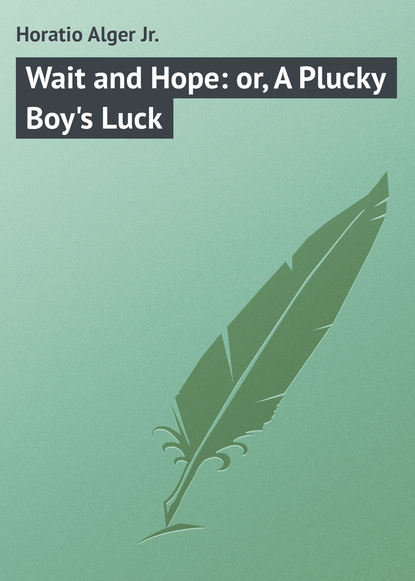По всем вопросам обращайтесь на: info@litportal.ru
(©) 2003-2025.
✖
Wait and Hope: or, A Plucky Boy's Luck
Настройки чтения
Размер шрифта
Высота строк
Поля
"I can't afford it," said Ben, "I guess I can get round by myself now."
So Tom left him with scant ceremony, and Ben sat down on a bench in City Hall Park to rest.
Chapter XII
An Adventure
Presently a young man, rather showily dressed, sat down beside Ben.
He glanced sharply at our hero, but did not immediately address him.
Finally he said: "Fine day, my young friend."
"Yes, sir, very fine," returned Ben politely.
"I suppose you live in the city?"
"No, sir, I am here only on a visit," said Ben, rather flattered by the supposition.
"I don't look so green, after all," he thought.
"So am I," said the other, "I live in Philadelphia."
"I am from the country," said Ben.
"Indeed! You have lived in the city some time, have you not?"
"No, sir."
"I am surprised to hear it. You have the appearance of a city boy."
Ben was not inaccessible to flattery. It was not surprising that he regarded the young man from Philadelphia with favor.
"Have you dined?" inquired the stranger.
"Not yet," said Ben. "I don't know where to find a restaurant."
"Say no more about it, my young friend. I shall be glad to have you dine with me. I know a good place, quite near by."
"You are very kind," said Ben, "considering that I am a stranger."
"I have a young cousin who resembles you very closely. I suppose that is why I cannot regard you as a stranger. By the way, what is your name?"
"Ben Bradford."
"Singular coincidence! My cousin is named Benjamin. My name is John Smithson. Well, Ben, if you will allow me the familiarity, suppose we go to dinner."
"Thank you, Mr. Smithson."
Ben followed his new acquaintance to a moderately-priced restaurant in Fulton Street. It was the first time he had ever been to an eating-house, and looked with interest at the numerous tables.
Smithson and he took seats at a small table opposite each other, and the former began to inspect the bill of fare.
"I hope you have a good appetite, my young friend," he said, "so that you may do justice to my hospitality."
"City people seem to be very kind," thought Ben. "No one in
Milltown would pay me such attention."
Finally he made his selection, and so did Smithson.
At the end of half-an-hour the dinner was concluded.
Smithson looked at the checks.
"Sixty cents and seventy-five cents," he said; "that makes a dollar and thirty-five cents."
"Yes, sir."
"I have go to step out a minute," said Smithson. "Oblige me by paying at the desk out of this bill."
As he spoke he handed Ben a five-dollar bill.
"But," said Ben, "there will be nearly four dollars left."
"Meet me an hour hence at the place where we were seated, and hand me the balance of the money."
"But," said Ben, "I might miss you. Haven't you better pay yourself, as you go out?"
"I am in a great hurry, to meet an engagement," said Smithson.
"Suppose I shouldn't meet you. Suppose I should keep the money."
"No fear. You look honest. Well, meet me in an hour;" and he hurried out of the restaurant, saying, with a nod to the cashier: "The boy will pay."
Here was another compliment, Ben thought. A perfect stranger had trusted him with three dollars and sixty-five cents, which he might readily make off with.
"I am glad I look honest," thought Ben. "I seem to be treated very well."
Two minutes later he went up to the cashier's desk, and, laying down the two checks, extended the five-dollar bill. The cashier was about to make change when his attention seemed to be drawn to the bill. He held it up, and scrutinized it very closely, considerably to Ben's surprise.
"Young man," said he suspiciously, "where did you get this bill?"
"From the man that came in with me," answered Ben.
"Are you aware that this is a bad bill?" asked the cashier sharply.
"A bad bill?" exclaimed Ben, in genuine surprise. "No, I had no idea of it."











